May 02, 2012
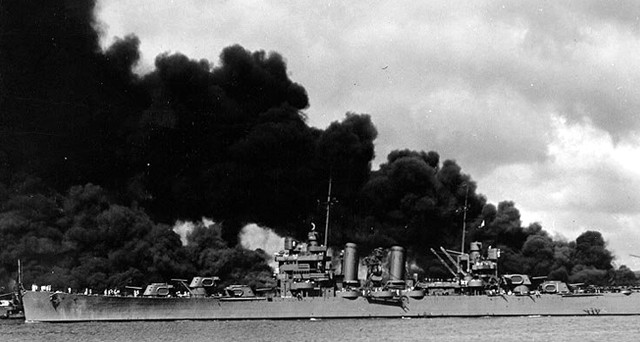
The Phoenix had an adventuresome war from the get-go. She spent nearly the entire time in the Pacific (other than a quick run to Casablanca in 1943, to deliver SecState Cordell Hull to a meeting), and was at Pearl Harbor on December 7th, 1941. She herself suffered barely any damage throughout the conflict, losing only one man to enemy action (near as I can tell, that is). When the Surrender was announced, she was heading to the US for a refit. She then officially joined the Atlantic Fleet just long enough to be transferred to the Reserve Fleet (Philadelphia) in 1946. Where she sat until 1951, which is when she was sold.
To Argentina, who renamed her ARA 17 de Octubre. Shortly after the coup that overthrew Juan Peron, the Argentinian Navy gave her the name under which she became famous:
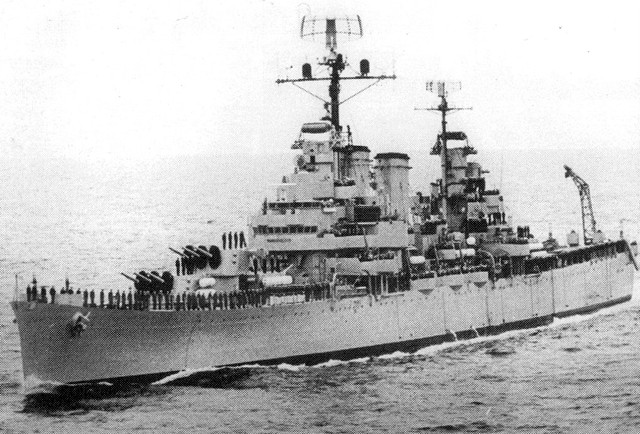
The General Belgrano. During the Falklands War, on May 2nd, 1982, she was involved in maneuvers against the oncoming fleet of Royal Navy ships. Thought to be part of a pincer operation with the 25 de Mayo, an ex-RN CVL carrying A-4 Skyhawks, if the Belgrano could close with the thin-skinned RN vessels, there'd be serious butchery at sea. Modern vessels aren't armored the way they used to be; the Belgrano was built like a bank vault in comparison to the Type 42 destroyers and the various frigates she'd be facing. She was a serious threat. And the Brits had a serious way of dealing with her: the nuclear-powered submarine HMS Conqueror, which had been shadowing the Belgrano for 36 hours. Once given the go-ahead, she fired three WWII era torpedoes at the cruiser.
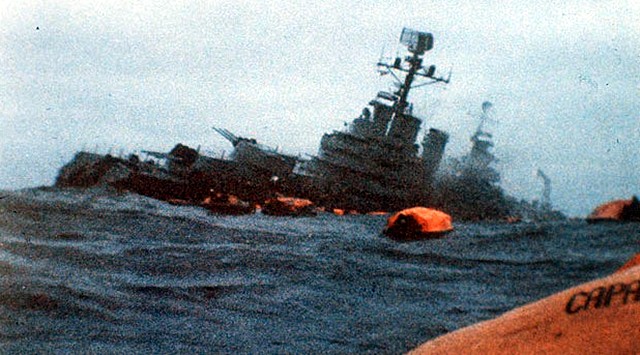
The second hit her forward of "A" turret, carrying away 40 feet or so of her bow. The third missed altogether, though it carried on and dented an Argentinian frigate (no explosion) some distance away. The first torpedo hit just behind the side armor plating, penetrated into the hull of the ship, then detonated. The explosion vented the boiler room to the sea, which began flooding immediately. It also blew out vertically, destroying two mess halls and a recreational area before taking out a 60 foot chunk of the main deck.
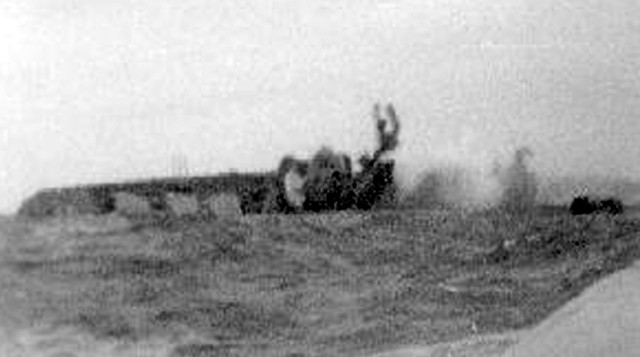
After her remaining crew had abandoned ship, the General Belgrano rolled on her ends, then sunk stern first. 770 crew were later rescued, a nigh-on miraculous feat, considering that her escorts never knew she was in trouble and sailed away.
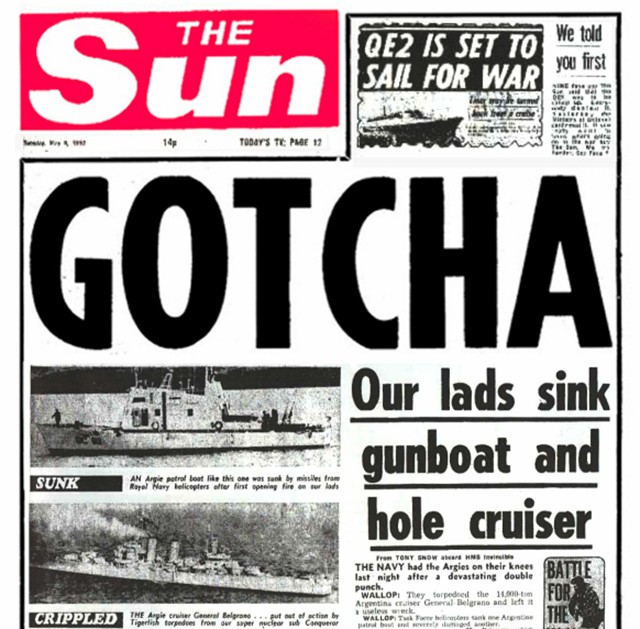
Posted by: Wonderduck at
09:53 PM
| Comments (10)
| Add Comment
Post contains 498 words, total size 4 kb.
The sinking was a little controversial back when it happened. Britain had declared a "total exclusion zone" that was, IIRC, 200 miles from the Falklands and announced that it would attack any vessels in that zone; the Belgrano was outside that zone by a good bit when it was sunk. The usual suspects got the vapors at the idea, while the military thought it was daft to go to the trouble of declaring an exclusion zone and then proceed to ignore it.
Funny little war, really. Can't imagine why they seem to want another go - it's not like we have the Soviets to worry about these days, hm?
Posted by: Avatar_exADV at May 02, 2012 10:33 PM (pWQz4)
In theory, if a RN DD stumbled across an ARA frigate near, say, southern Japan, the two could immediately start shooting at each other.
There's no way the skippers of the Belgrano's escorts should be given a free pass. Not sinking (or even detecting) the Conqueror is one thing... the SSN's job is to be unheard, after all... but it's a completely OTHER thing for that WWII-era cruiser, that's ON YOUR SIDE, to be unheard while it's sinking. Bloody miracle any survivors were found, let alone 700+.
Posted by: Wonderduck at May 02, 2012 10:45 PM (6CHh4)
What is really funny is that usual suspects who claim the sinking of the General Belgrano to be illegal have largely based their case on the fact that she was heading west (i.e. Away from the ships of Operation Corporate.) when HMS Conqueror torpedoed the cruiser. But the Argentine Navy has admitted that the Belgrano and her group were simply on the westward leg of her patrol circuit, not heading back to port, and was ready to attack the British if the opportunity arose. Thus the British sinking her should not have come as a surprise to anyone.
A footnote to the story is that the Argentine operation which was suppose to have aircrafts from 25 de Mayo and the Belgrano hit the British task force was postponed before the cruiser's sinking, supposedly because the wind was too light for carrier operations. However, it appears the actual reason is that the Argentines had lost track of where the British ships were, and thus were marking time until they could be located again.
Then we have the story of the RN Sea King which ended up ditching in Chile, but that is a story for another day.
C.T.
Posted by: cxt217 at May 02, 2012 10:59 PM (YFCvg)
Avatar - it seems like the Argentines always press on the Falklands whenever the government of the time has domestic problems. That was why the Junta went for invasion in 1982.
There was also the attitudes of the British over the Falklands (There are the usual voices in Britain who call for handing the islands over to the Argentines now, as then.), and attitudes of other nations vis a vis the issue.
Mind you, the correlation of forces today would indicate the British that was less capable in some ways (The Royal Navy has one carrier.) and more in others (Tornado fighters based in the Falklands, and cruise missiles from SSNs.). But correlation of forces did not matter to the Junta in 1982 and it might not matter to an Argentine president now, both trying to save their position from internal opposition by whatever means possible. I sincerely hope President Kirchner remembers the fate of the Junta when she grandstands over the Falklands but there are strong reasons to doubt it.
C.T.
Posted by: cxt217 at May 02, 2012 11:07 PM (YFCvg)
But a couple of years ago a North Korean submarine sank a South Korean surface warship. Which damned near restarted the Korean War.
Posted by: Steven Den Beste at May 02, 2012 11:07 PM (+rSRq)
Posted by: Pete at May 02, 2012 11:32 PM (5OBKC)
Argentine is weaker now than it was in 1982, too, so correlation of forces is probably not going to be more of a consideration now than it was in 1982.
Posted by: cxt217 at May 03, 2012 12:00 AM (YFCvg)
Personally, I roll my eyes at the thought that sinking an enemy warship in a time of war could ever be considered controversial.
Posted by: flatdarkmars at May 03, 2012 12:06 AM (I55Es)
Posted by: Mauser at May 03, 2012 02:21 AM (cZPoz)
Personally, I roll my eyes at the thought that sinking an enemy warship in a time of war could ever be considered controversial.
Common sense would dictate that, but the familes of some of the Argentine crewmembers lost with the General Belgrano did try to sue the British government on the basis that the Belgrano was heading west towards Argentine, thus was not a threat to the British and therefore the British had no right to attack and sink her, which was why they demanded recompense from the British government. The number of failures in their reasoning - undermined by, among others, the Argentine navy - says volumes.
C.T.
Posted by: cxt217 at May 03, 2012 04:26 PM (YFCvg)
47 queries taking 0.1791 seconds, 286 records returned.
Powered by Minx 1.1.6c-pink.









